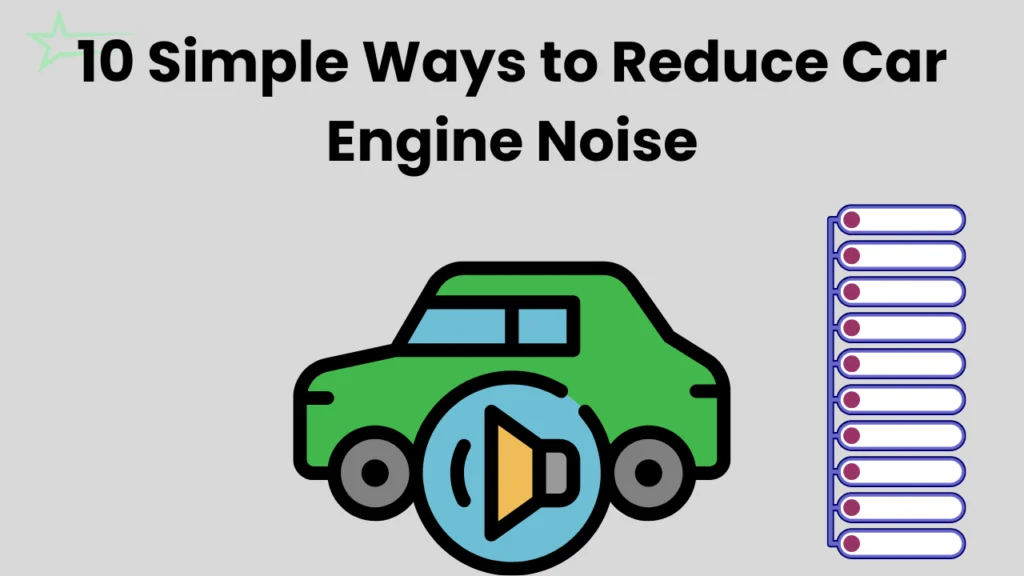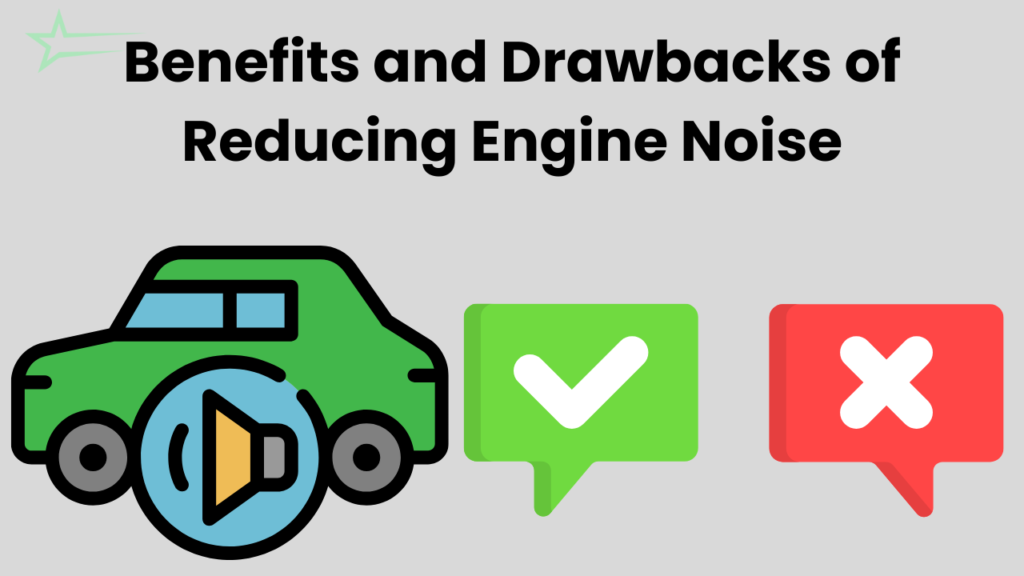How to reduce car engine noise while driving? Engine noise can disrupt the peaceful experience of driving. Whether you’re dealing with vibrations, rattles, or other loud sounds, these 10 expert-backed steps will help you achieve a quieter ride, extend your vehicle’s life, and enhance comfort.
Quick Reference Table: Steps to Reduce Engine Noise
| Step | Action |
|---|---|
| 1. Identify Noise Source | Diagnose where noise originates to apply targeted solutions |
| 2. Use High-Quality Oil | Change oil regularly to reduce friction and noise |
| 3. Tighten Loose Parts | Inspect and secure loose components to prevent rattling |
| 4. Install Hood Insulation | Add soundproofing mats under the hood to absorb noise |
| 5. Replace Worn Belts | Check and replace belts that may be causing squeals |
| 6. Check Exhaust System | Repair leaks or replace damaged mufflers |
| 7. Add Underbody Insulation | Install soundproofing on the car’s underbody |
| 8. Swap Old Spark Plugs | Replace spark plugs to ensure smoother engine performance |
| 9. Clean Engine & Intake | Remove debris and build-up to reduce unwanted sounds |
| 10. Use Engine Covers | Install engine covers to trap and dampen sound |
Step-by-Step Guide: 10 Simple Ways to Reduce Car Engine Noise

1. Identify the Noise Source
- Inspect Thoroughly: Listen to different areas around the engine. Knocking sounds may come from inside the engine block, while rattles can indicate loose parts.
- Use Diagnostic Tools: A mechanic’s stethoscope is a handy tool to help pinpoint noise sources, especially if you’re unsure about where to begin.
2. Use High-Quality Engine Oil
- Lubricate Properly: Premium engine oil reduces friction, one of the main sources of noise. Changing oil regularly (every 3,000 to 5,000 miles) will keep the engine running smoothly and quietly.
- Consider Oil Additives: Additives can further enhance lubrication, providing additional protection to reduce friction-based noise.
3. Check and Tighten Loose Parts
- Inspect Bolts and Belts: Rattling can often be due to loose bolts or components around the engine. Check bolts, hoses, and belts for secure placement.
- Engine Mounts: Old or worn engine mounts cause excessive vibration. Replacing them can stabilize the engine and reduce noise levels.
4. Install Hood Insulation
- Soundproofing Mats: Adding hood insulation absorbs much of the engine noise before it escapes the engine bay. This material is generally adhesive, making it easy to apply under the hood.
- Cost-Effective Solution: Insulation mats are an affordable option for dampening sound, and they can be installed in under an hour.
5. Replace Worn Belts and Pulleys
- Fix Squealing Noises: Damaged belts like the serpentine or timing belt can lead to high-pitched squealing. Replacing them helps maintain smooth, quiet operation.
- Routine Inspections: Make it a habit to check the belts and pulleys as part of regular maintenance.
6. Inspect the Exhaust System
- Repair Leaks: Exhaust leaks are among the most common reasons for increased engine noise. Addressing these leaks promptly can restore quietness to your vehicle.
- Muffler Condition: A worn or broken muffler amplifies engine sounds. Replacing it can make a significant difference, especially at higher speeds.
7. Add Underbody Insulation
- Reduce Cabin Noise: Underbody insulation absorbs road and engine noise, leading to a quieter cabin. Insulating the car’s underside is especially beneficial for highway driving.
- Protect Against Road Debris: Insulation can also act as an additional barrier against road debris, extending the lifespan of the car’s underbody.
8. Replace Old Spark Plugs
- Prevent Misfires: Spark plugs in poor condition can cause misfiring, making the engine sound rough and uneven. Replacing them ensures smoother combustion and less noise.
- Simple Solution: Spark plugs are affordable and easy to replace, yet they can drastically improve how quietly the engine runs.
9. Clean the Engine and Intake System
- Remove Build-Up: Debris, carbon deposits, and other build-up can lead to rough engine operation, increasing noise levels. Regular cleaning keeps the engine running smoothly.
- Intake Cleaner: Use intake and throttle body cleaners to remove grime. Adding a fuel system cleaner periodically can also reduce internal deposits that might be causing noise.
10. Use Engine Covers for Soundproofing
- Trap and Absorb Noise: Engine covers are specifically designed to trap engine noise. They are made of sound-absorbing materials that can significantly reduce the amount of noise emitted.
- Enhanced Insulation: Many modern cars come with covers that work well to quiet engine sounds. If yours doesn’t have one, consider an aftermarket option for added soundproofing.
Benefits and Drawbacks of Reducing Engine Noise

Pros:
- Improved Comfort: A quieter engine makes for a more pleasant driving experience.
- Increased Vehicle Longevity: Addressing noise sources often prevents larger mechanical issues.
- Higher Resale Value: Vehicles that run smoothly and quietly often command better resale prices.
Cons:
- Initial Costs: Adding insulation and other soundproofing features involves some upfront cost.
- Time Investment: Routine checks for engine noise reduction require time but are worth the long-term benefits.
Facts & Figures
- Soundproofing Impact: Engine soundproofing can reduce cabin noise by up to 30%.
- Engine Oil Quality: Regular oil changes (every 3,000–5,000 miles) have been shown to significantly reduce engine noise.
- Belts and Spark Plug Replacement: Worn belts and plugs are responsible for 20% of all engine noise complaints, making them cost-effective noise-reduction steps.
FAQs
How can I make my car engine quieter?
Regularly replace engine oil, tighten loose components, and add soundproofing like hood insulation and underbody mats.
What can I use to reduce engine noise?
High-quality engine oil, soundproofing materials, new belts, and engine covers are excellent options for reducing noise.
Why is my car engine so loud when driving?
A loud engine may be caused by issues like exhaust leaks, worn belts, or spark plug problems. Regular maintenance can help.
How can I reduce road noise while driving?
Road noise can be minimized with underbody insulation and door soundproofing, which helps keep the cabin quieter.
Conclusion
By following these 10 steps, you can substantially reduce car engine noise, enhance your driving experience, and ensure a longer-lasting engine.
Implementing soundproofing techniques like hood and underbody insulation and following regular maintenance will keep your car running quietly and smoothly.
In summary, reducing car engine noise is a multi-step process that enhances driving comfort, protects your vehicle, and contributes to road safety.
By taking proactive measures—such as regular oil changes, securing loose parts, adding soundproofing materials, and addressing potential issues like exhaust leaks—you’re not only improving your ride’s tranquility but also extending its longevity.
Each of these steps can be performed individually to bring down noise levels, but together they deliver the best results, creating a noticeably quieter cabin.
Moreover, investing in soundproofing measures like engine covers or underbody insulation might seem like an upfront expense but pays off over time with a smoother, more enjoyable driving experience.
Routine maintenance and attention to noise can prevent minor issues from becoming major repairs, enhancing your car’s performance and potentially raising its resale value.
Ultimately, addressing engine noise isn’t just about comfort; it’s about creating a better, safer, and more enjoyable driving environment.
Take these steps seriously to make your vehicle a peaceful space on the road, whether for everyday commutes or long road trips.
With these steps, you’ll find it easier to enjoy a quieter drive. Remember, a well-maintained car is not only quieter but also safer and more efficient. For more insights on car maintenance and customization, check out these resources:











3 thoughts on “How to reduce car engine noise while driving? |10 Simple Steps”